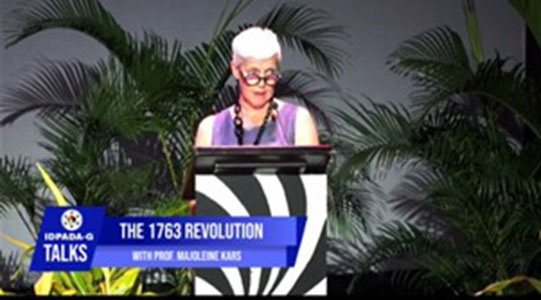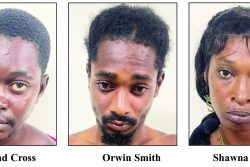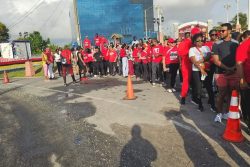The author of a book on the 1763 uprising has called for broader recognition of its heroes and legacy.
At an event hosted on Saturday by the International Decade for People of African Descent Assembly-Guyana, Professor Majoleine Kars captivated a jam-packed auditorium at the Theatre Guild with a comprehensive presentation on the 1763 Berbice Revolution, its significant historical context, and the celebration of its unsung heroes.
Professor Kars, who was born and raised in the Netherlands and now teaches history at the prestigious Massachusetts Institute of Technology (MIT) in Cambridge, wrote a book on the 1763 Berbice Revolution. “Blood on the River”, which has garnered wide publicity here, delves into Dutch records from both Dutch and British archives to shed light on this pivotal period.
The Berbice Revolution, which took place in what is now Guyana, is a critical chapter in the narrative of Caribbean slave revolts. Professor Kars stressed that understanding the Berbice Revolution provides invaluable insights into the political and intellectual history of the enslaved African diaspora. It also offers a broader perspective on the series of slave uprisings that occurred from Africa to the Caribbean, including the Haitian Revolution and Latin American independence movements.
In her presentation, Prof Kars detailed the early history of Berbice within the Dutch colonial framework. She traced its origins to the late 1500s when European powers, having gained access to the South Atlantic following the defeat of the Spanish Armada, scrambled for colonies along the “wild coast” between the Orinoco and Amazon rivers. By 1616, the Dutch established their first trading post on the Essequibo River and later expanded to Berbice with the assistance of Amerindians.
The Dutch imported captives from West Africa to work on plantations growing tobacco, sugar, cocoa, cotton, and coffee. In the early 18th century, private investors from Amsterdam founded the Berbice Company, which managed the colony until the Dutch government assumed control in the 1790s. However, by the early 19th century, Berbice, along with Essequibo and Demerara, became part of British Guiana, marking the end of Dutch colonial influence in the region.
Prof Kars presented a treasure trove of historical documents from Berbice, including an 800-page daily journal of the governor, detailed correspondence between colonial and military leaders, and particularly rare documents that include the correspondence between the leader of the uprising, Kofi, and the Dutch governor. Additionally, she delved into sections of the 500 pages of judicial investigations into the aftermath of the rebellion, where nearly 900 individuals—more than half the surviving adult population in Berbice—were interrogated as suspects.
The documents provide a stark portrayal of the rebellion and its suppression, with testimonies revealing signs of duress and responses meticulously crafted by the Dutch authorities. The investigation highlights the brutal punishments imposed on those involved in the rebellion, including destruction of property and the murder of “Christian” individuals, she stated.
Prof Kars emphasized the importance of not only celebrating figures like Kofi and his fellow leaders but also acknowledging the contributions of the numerous unnamed men and women who participated in the rebellion. Many of these individuals, some of whom may have acted reluctantly or with personal motivations, sought to improve their lives and those of their families rather than merely serving their oppressors. Recognizing these contributions helps to provide a more complete and nuanced understanding of the rebellion and the struggle for self-governance and autonomy.
Kars called for a broader recognition of the Berbice Revolution’s heroes and its enduring legacy. By commemorating both the prominent leaders and the everyday individuals who played a role in the uprising, Prof Kars called on the audience to gain a deeper appreciation for their sacrifices and the rich history of resistance and resilience that shaped the Caribbean and beyond.
In attendance on Saturday were former president Donald Ramotar and former prime minister Moses Nagamootoo.








